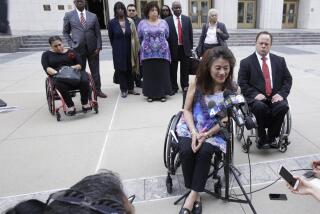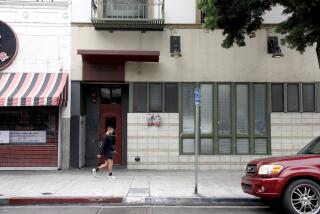Los Angeles sued over homeless housing money by AIDS nonprofit
An AIDS foundation that has tangled with the city over real estate development and lambasted its handling of the homelessness crisis is now suing Los Angeles, arguing that it was improperly turned down for funding to house homeless people.
In its lawsuit, the AIDS Healthcare Foundation accused the city of violating L.A. rules when the foundation was rejected for nearly $25 million in funding from Proposition HHH, a $1.2-billion bond measure approved by voters.
The foundation had sought the money to build more than 200 units of supportive housing in skid row, planning for a tower filled with “microunits.” The city gave its proposal a score of 63 out of 100, docking it points under categories including “financing structure and cost efficiency” and “organizational structure, experience and capacity.”
The group said in its lawsuit that the city had failed to produce specific records it had requested about the bidding process, but that a housing department staffer told the foundation that it was concerned about its “perceived lack of experience as a developer” and its proposed method of construction.
The foundation argued that neither was a valid reason to mark down its application under city rules. The group had sought the money under an innovation challenge launched by the city to find faster and cheaper ways to get homeless people into housing.
In a conference call with reporters Tuesday, foundation President Michael Weinstein said it was the only bidder in the innovation challenge who already owned the needed land and had lower costs, per unit, than other bidders. Weinstein argued that the city would fail to address the crisis if it didn’t drive down costs for such housing significantly.
“If we always do what we always did, we’ll always get what we always got,” Weinstein told reporters.
A few years ago, the group launched a new division called the Healthy Housing Foundation and started converting existing buildings into housing, touting it as a cheaper and more efficient way to help poor tenants.
When asked about issues at one of its existing buildings on skid row — a 7th Street property where the city has fielded complaints — Weinstein said that the city ordering them to stop work there had been “completely unjustified” and showed a lack of urgency to “get things done.”
“We believe that the most urgent thing is to get somebody off the sidewalk,” Weinstein said. “And that’s what we’ve done and what we will continue to do.”
When L.A. turned down an earlier appeal by the foundation over the funding decision, a city official said in a letter that it found “no basis” for claims that the scoring process had been arbitrary or that it had violated established procedures.
The “process was fair to all applicants,” Alex Comisar, a spokesman for Mayor Eric Garcetti, said in a statement Tuesday. “While AHF wasn’t awarded HHH funds, we appreciate their work to create more affordable housing and look forward to partnering with them in the future.”
Rob Wilcox, a spokesman for City Atty. Mike Feuer, said the office would review the legal complaint filed by the foundation and had no further comment Tuesday.
The foundation, a massive nonprofit that has become a political player in L.A., has frequently sparred with the city in court: It has repeatedly sued the city over development projects that it argues will worsen traffic and fuel gentrification. It has also been a sharp critic of how L.A. and its leaders have tried to tackle homelessness, erecting billboards this year that declare “Homelessness Kills.”
The foundation has also gathered signatures for a November 2020 statewide ballot measure that would allow cities and counties to impose stricter restrictions on rent hikes than are currently allowed under state law.
More to Read
Sign up for Essential California
The most important California stories and recommendations in your inbox every morning.
You may occasionally receive promotional content from the Los Angeles Times.











